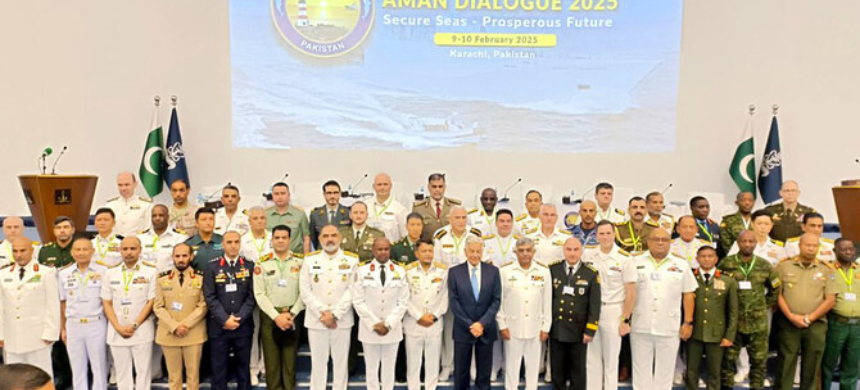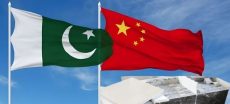Aman 2025: Strengthening Maritime Cooperation and Economic Prospects
The Aman 2025 exercise, organized by the Pakistan Navy, has evolved into a significant diplomatic and strategic event, attracting participation from over 60 nations.
Held at the Pakistan Naval Academy, the exercise not only promotes naval collaboration but also serves as a key platform for advancing Pakistan’s blue economy, regional stability, and maritime trade security.
Pakistan’s Defence Minister Khawaja Asif, speaking with Samaa Digital’s senior journalist Asim Siddique, highlighted the strategic significance of the event, calling it a prestigious achievement for the country. He assured that the government is committed to bolstering Pakistan’s maritime security and economic interests.
Read More: Maritime Exercise AMAN-25 and AMAN Dialogue Begin in Karachi
Expanding the Blue Economy
With 60% of global trade depending on maritime routes, the blue economy—comprising fisheries, tourism, shipping, and offshore resources—has become vital for economic growth.
Although Pakistan’s maritime territory has expanded by 500 square kilometers, bureaucratic obstacles and security concerns have hindered its full potential.
Senator Mushahid Hussain emphasized that Pakistan must leverage its maritime resources and the opportunities presented by Aman 2025.
“Pakistan has vast potential in the blue economy, but it remains underutilized. This exercise offers an important platform for maritime cooperation, investment, and security coordination,” he said.
With naval forces from over 80 countries participating, Pakistan has a chance to attract foreign investments in its ports, shipbuilding industry, and coastal tourism. Additionally, discussions on sustainable ocean management—an area where Pakistan still lags—are expected to gain traction.
Situated near some of the world’s busiest sea lanes, Pakistan’s coastline is a crucial hub for regional security and trade. Gwadar Port, a key component of the China-Pakistan Economic Corridor (CPEC), serves as a gateway for commerce between Asia, the Middle East, and Africa.
The involvement of Iranian naval forces further underscores growing regional security partnerships. Speaking at the Aman Dialogue, the Iranian Naval Commander reaffirmed Iran’s commitment to securing trade routes and ensuring uninterrupted maritime commerce in the Indian Ocean.
“We do not believe Iranian-controlled trade channels are under threat. Security depends on strategic cooperation and regional stability,” he stated.
By strengthening defense collaborations with Iran, China, and other maritime powers, Pakistan is positioning itself as a key player in Indian Ocean security and trade.
Maritime Diplomacy and Global Geopolitics
The Aman 2025 exercise comes at a time of shifting global alliances. The possible return of Donald Trump to power in the United States has sparked speculation about changes in U.S. naval strategy in Asia and the Indo-Pacific.
Commenting on these geopolitical shifts, Mushahid Hussain stated:
“Trump’s return could lead to policy changes, but Pakistan will not succumb to external pressure regarding its economic and security choices.”
Pakistan’s strategic partnership with China remains a cornerstone of its foreign policy, particularly in the naval sector, where both countries continue to deepen defense and trade relations.











